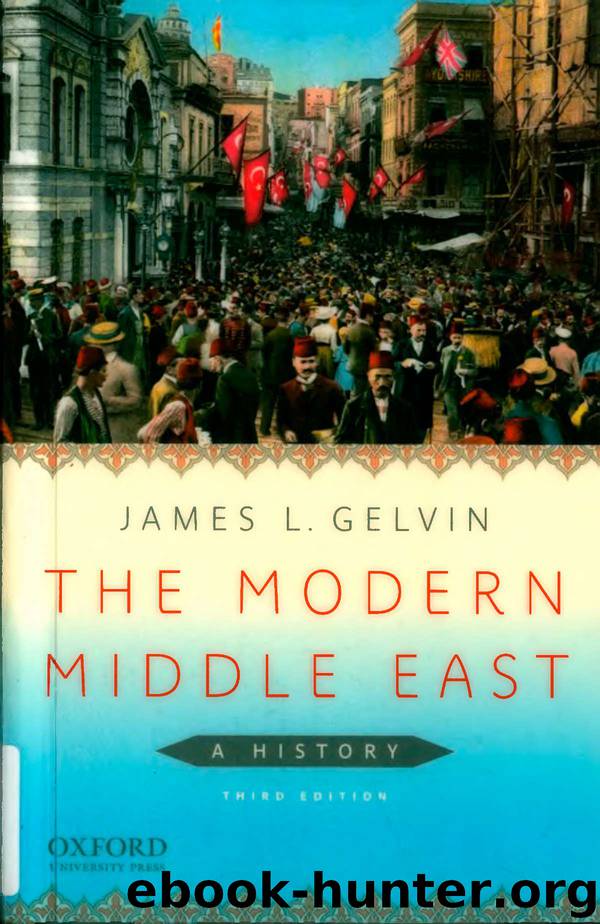The Modern Middle East. A History by James L. Gelvin

Author:James L. Gelvin
Language: eng
Format: epub
ISBN: 978-0-19-976605-5
Publisher: Oxford University Press
Published: 2008-10-27T04:00:00+00:00
EGYPT
World War I had both political and economic consequences for Egypt. Although Britain had occupied Egypt since 1882, Egypt had been legally part of the Ottoman Empire until World War I. In December 1914, after the outbreak of war, Britain declared Egypt a protectorate, ending Ottoman sovereignty once and for all.
British rule in Egypt had become increasingly unpopular over the course of its history, and by the end of World War I the British had managed to alienate virtually all segments of the Egyptian population. During the war, the British had established controls over the marketing of cotton, thereby alienating the influential stratum of large landowners. Wartime inflation devastated the living standards of civil servants, the urban poor, and even the peasantry. Peasants also suffered from famine during the war. The complaints of Egyptians found voice among an educated stratum of intellectuals and activists who, at the close of the war, found release from the constraints of wartime repression.
All that was needed to ignite the tensions between much of the Egyptian population and the British occupiers was a spark. That spark was touched off in November 1918, when a delegation of Egyptian politicians, testing the limits of the Woodrow Wilsons twelfth point ("nationalities which are now under Turkish rule should be assured... an absolutely unmolested opportunity of autonomous development," in case you forgot), petitioned the British high commissioner in Cairo for permission to go to Paris to represent the Egyptian population at the peace conference. The leader of this group was Sa‘d Zaghlul. Although born into a family of mid-level peasants, Zaghlul had married well (his wife was a daughter of an Egyptian prime minister). He procured a number of important positions in the Egyptian government, including those of minister of education, minister of justice, and vice president of the legislative assembly. During the war, Zaghlul used the last position to organize nationalist committees throughout Egypt.
When the British arrested and deported Zaghlul and his colleagues for their presumption, the committees founded during the war sprang into action. Demonstrations and strikes broke out throughout Egypt in the spring of 1919. They spread from students and labor activists to artisans and civil servants and even the urban poor of Cairo. Peasants, fearing imminent starvation, attacked the rail lines by which scarce food supplies might be taken to distant cities. Alongside the peasants were many rural landowners, who not only had complaints of their own but who feared social upheaval if they stood on the sidelines. The revolt— called by Egyptian nationalist historians the 1919 Revolution — lasted two months before the British put it down by force.
In response to the uprising, the British government appointed a commission under Lord Milner to investigate its causes and to propose a solution. The Milner Commission concluded that Britain could not hope to keep direct control of Egypt and that British interests might best be maintained in Egypt if Britain gave Egypt conditional independence. Only then could the British hope to rein in the most vehement Egyptian nationalists.
Download
This site does not store any files on its server. We only index and link to content provided by other sites. Please contact the content providers to delete copyright contents if any and email us, we'll remove relevant links or contents immediately.
| Africa | Americas |
| Arctic & Antarctica | Asia |
| Australia & Oceania | Europe |
| Middle East | Russia |
| United States | World |
| Ancient Civilizations | Military |
| Historical Study & Educational Resources |
Empire of the Sikhs by Patwant Singh(23057)
The Wind in My Hair by Masih Alinejad(5070)
Rise and Kill First by Ronen Bergman(4758)
The Templars by Dan Jones(4672)
The Rape of Nanking by Iris Chang(4189)
12 Strong by Doug Stanton(3539)
Blood and Sand by Alex Von Tunzelmann(3180)
Babylon's Ark by Lawrence Anthony(2658)
The History of Jihad: From Muhammad to ISIS by Spencer Robert(2610)
No Room for Small Dreams by Shimon Peres(2355)
The Turkish Psychedelic Explosion by Daniel Spicer(2344)
Inside the Middle East by Avi Melamed(2340)
Gideon's Spies: The Secret History of the Mossad by Gordon Thomas(2328)
Arabs by Eugene Rogan(2289)
The First Muslim The Story of Muhammad by Lesley Hazleton(2256)
Come, Tell Me How You Live by Mallowan Agatha Christie(2239)
Bus on Jaffa Road by Mike Kelly(2138)
Kabul 1841-42: Battle Story by Edmund Yorke(2013)
1453 by Roger Crowley(2012)
